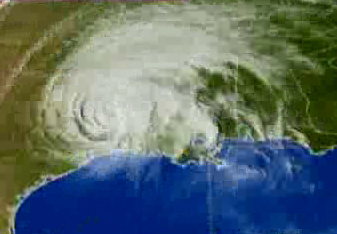Atlantic hurricane season blows away records 
Cooling the Earth through giant storms. Corresponding with the observation of a record number of Atlantic hurricanes in 2008 was the finding by a group of international scientists that these intensifying and more frequent storms are Nature’s reaction to global warming. A collaborative study of British, Japanese and Formosan (Taiwanese) researchers revealed that hurricanes and typhoons actually reclaim large amounts of carbon dioxide through their immense water movements, with the carbon finally being stored in river and ocean beds.
However, as lead UK scientist Robert Hilton pointed out, “The rate at which this happens is around 100 to 1,000 times slower than the amount of carbon dioxide that is being pumped into the atmosphere by man's activity.” Dr. Hilton and colleagues, we appreciate this insightful discovery of the Earth’s attempts to restore natural balance. Blessed be our kinder and more sustainable lifestyles in lessening the need for such extreme patterns, leading to a gentler climate for all.
Forests under threat from climate change: study Forest demise is accelerating climate change. This was the message in a report made by the Center for International Forestry Research in Jakarta, Indonesia which is urging protective measures for the world’s forests at the upcoming United Nations climate conference in Poznan, Poland. According to the report, small changes in climate can cause larger effects in forests, leading to increased susceptibility to drought, disease and fires. The report also reminded of the damaging effect of burning trees to clear farmlands, a practice that is responsible for 20 percent of greenhouse gas emissions. Center for International Forestry Research, we welcome your concerned voice on behalf of the vital and beautiful lungs of our Earth. Our prayers for the fruitfulness of all efforts to save the precious forests.
In 1995, Supreme Master Ching Hai had reiterated to our Association members the importance of forest preservation.
Supreme Master Ching Hai : If we keep burning forests, there'll be nothing to hold the water and to keep it flowing slowly. Instead, it will flow down all at once. It will cause many big floods on Earth. It's all because we've destroyed too many forests. Since there are no trees, nothing else can hold the water there.
If the water rushes down all at once, any river would overflow. That's why we've had more and more floods recently. Although our country and our planet become more civilized, there still are too many disasters such as floods, drought and fires. Because we've carelessly destroyed too much of nature. We also need to protect our forests. Otherwise we'll have heavy floods. So protecting nature is protecting ourselves.
Some 2,000 Indonesia small islands may disappear soon Human activities leave Indonesia’s islands in jeopardy. Unregulated mining and other unsustainable activities, combined with rising sea levels due to global warming are changing the landscape of the many-island nation, said Freddy Numberi, Minister of Maritime Affairs and Fisheries. Minister Numberi stated that 24 islands have already disappeared beneath the ocean and another 2,000 are facing the same fate unless actions are taken to ensure their protection. Minister Numberi, we join in your concern for your nation and fellow citizens. Let us join in good stewardship to sustain our surroundings for years to come.
Food production in developing economies most vulnerable to climate change Climate change will diminish food production in Asia-Pacific region. A new report by the non-governmental organization Pacific Economic Cooperation Council forecasts that rising sea levels affecting Southeast Asia as well as parts of China and the Pacific Islands will decimate agriculture in lower coastal areas.
Already it is estimated that 210 million people in the region are “food insecure,” with further agricultural decline to affect even more. Pacific Economic Cooperation Council, we appreciate this important study on how climate change is affecting food supply. May we heed these warnings and quickly adopt responsible measures to protect our planet.

